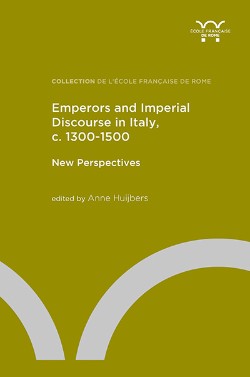Catalogue
| Antiquité | Moyen Âge | Époque moderne et contemporaine | Recherche simple | Recherche combinée |

Describing the Holy Roman Empire after 1250 as a hopeless dream or an empty formula only Roman in name, historians have long minimized the impact of the imperial presence in late-medieval Italy. The nationalist historiography, on which we still largely depend, presented the Empire as alien to the very essence of humanism and modernity. Associating humanism with republicanism, scholars silently suggested that the belief in the peace-bringing emperor faded away as the Renaissance unfolded. No real humanist, so it was believed, could genuinely support the medieval construct that was the Holy Roman Empire.
Anne Huijbers wrote her dissertation at Radboud University Nijmegen. Between 2016 and 2018 she stayed at the École française de Rome with a Rubicon Fellowship of the Netherlands Organisation for Scientific Research. |


